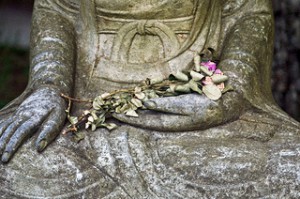Wednesday
Featured StoriesInvestigating Radical Compassion

photo credit: David Gabriel Fischer · Zen Photography via photopin cc
Interview with Jerry Colonna, Chair of the Board at Naropa University
written by Jayne Sutton, Shambhala Times Volunteer
“When you walk into this world of reality, the greater or cosmic world, you will find … a deep sense of aloneness. It is possible that this world could become a palace or a kingdom to you, but as its king or queen, you will be a monarch with a broken heart. It is not a bad thing to be, by any means. In fact it is the way to be a decent human being—and beyond that a glorious human being who can help others.”
~ Chogyam Trungpa Rinpoche in Shambhala: The Sacred Path of the Warrior
In an interview marking Naropa University’s 40th anniversary celebrations, Board Chair Jerry Colonna reflected on the notion of “Radical Compassion,” the theme of Naropa’s symposium in honor of this milestone.
Jerry is a former venture capitalist turned professional coach who also serves widely in the non-profit world beyond Naropa. He brings his experience of working with his coaching clients to his understanding of just how compassion can be radical in the context of business as well as daily life. Describing corporations as collections of broken hearted individuals struggling for a sense of purpose, he sees his work as a way to help make the workplace nonviolent to self, community, and the planet. To do that, he says, one needs to live fully in every milieu — and refrain from “ghetto-izing” compassion into the so-called spiritual compartment of one’s life.
“[R]adical compassion to me is not a soft compassion. It’s not a compassion that comes from a place of privilege…. To me, radical compassion is not me helping you. It’s us confronting the pain and suffering of the world together.” This perspective imbued the presentations offered at the Naropa symposium, where speakers of diverse backgrounds and orientations — from spiritual teachers and contemplatives to environmental activists and research scientists — brought their understanding of how to relate to, confront, and change the many seemingly insurmountable challenges we face as a society. In different ways and with different language, the point seemed to be, as it was put in the title of one plenary panel discussion, opening our hearts to the world as it is.
And experiencing the world as it is includes witnessing our own grief and broken-heartedness, rather than pushing them away. In Jerry’s words, that means “normalizing” our feeling of broken heart — discovering that everyone feels this way, rather than internalizing the notion that the feeling is not OK. For all its political connotations, the word radical points to that which lies at the root, that which is fundamental.
So, in this way, says Jerry, “Radical compassion is seeing the interconnectedness of all things… the illusion of our separateness is really behind the broken-heartedness. And that when we touch into our interconnectedness, we get past that sadness. It’s like ‘oh, oh, we’re not equal, we are the same.’”
Jerry further points to reflections by Christian contemplative Thomas Merton on the Buddhist tradition of the begging bowl: “[M]onks will go out in the morning with nothing, and perhaps no one will put food into the bowl, and perhaps someone will put food into the bowl. The symbol of the bowl is a symbol of our interconnectedness because the act of placing something into the bowl, and the act of receiving from the bowl is the same act. It’s an expression of our shared humanity. It’s an opportunity to demonstrate more fully our brokenness and our humanity.”
As one Radical Compassion Symposium participant posted as part of an opening group exercise: Heart to heart = radical.
Read more articles in the Radical Compassion column by clicking here.
~~
Jerry Colonna is a certified professional coach and currently the Chair of the Board for Naropa University. Previously, he was a venture capitalist and co-launched Flatiron, which became one of the most successful early-stage investment programs. He was also an investor with JP Morgan Partners and a founding partner of Internet-specific venture firm CMG@Ventures L.P. On Naropa’s board of trustees since 2010, he was included in Upside Magazine’s list of the 100 most influential people of the new economy, Forbes ASAP’s list of the best VCs in the country, and Worth’s list of the 25 most generous young Americans.






Jul 14, 2015
Reply
There is an important insight missing from Mr. Colonna’s account of “radical compassion” that doesn’t quite go to the “root,” causing his view to be less than truly “radical.” Here, we have to go to Liberation Theology and the account of “interconnectedness” (or “interdependence”) presented by Leonardo and Clodovis Boff in their book INTRODUCING LIBERATION THEOLOGY (1987), and then connect that teaching to an often neglected teaching of Chogyam Trungpa. Here’s the Boff brothers:
“The end of the 1960’s, with the crisis of populism and the developmentalist model, brought the advent of a vigorous current of sociological thinking, which unmasked the true causes of underdevelopment. Development and underdevelopment are two sides of the same coin. All the nations of the Western world were engaged in a vast process of development; however, it was interdependent and unequal, organized in such a way that the benefits flowed to the already developed countries of the ‘center’ and the disadvantages were meted out to the historically backward and underdeveloped countries of the ‘periphery.’ The poverty of Third World countries was the price to be paid for the First World to be able to enjoy the fruits of overabundance.”
The root of that INEQUALITY is our “habitual tendency” to “dualistically fixate” (same as “center-periphery polarization”), the desire for “this” to gain, “that” to lose. For an account of that process, which has been going on for millennia, see “The Development of Ego” chapter of CUTTING THROUGH SPIRITUAL MATERIALISM, and for a detailed historical account of “center-periphery polarization” in Latin America, see Eduardo Galeano’s THE OPEN VEINS OF LATIN AMERICA.